BMP4002 Business Law: Detailed Report on the UK Legal System
VerifiedAdded on 2023/06/17
|10
|2456
|86
Report
AI Summary
This report provides a comprehensive overview of the UK legal system within the context of business law. It begins by defining laws and identifying the legal systems in the UK, differentiating between England and Wales, and Scotland. The report then classifies laws into civil and criminal categories, explaining the roles of the High Court and Supreme Court. Further, it explores case law and legislation as sources of law, including delegated legislation. The report also examines UK employment law, detailing statutory duties of employers and addressing wrongful and unfair dismissal actions. The conclusion emphasizes the significance of business law and summarizes the key areas covered in the report, including the classification of law, sources of law, and employment law.
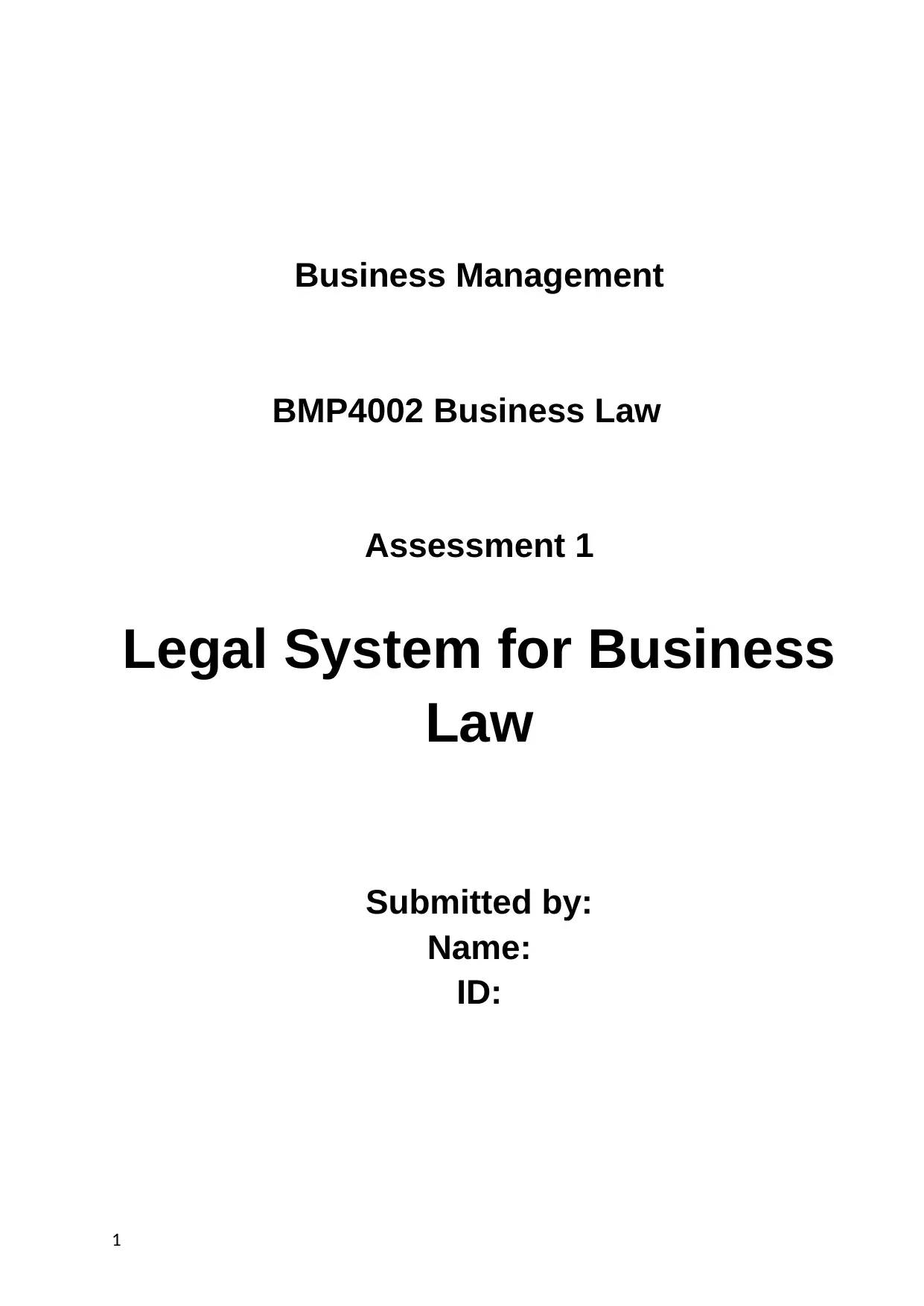
Business Management
BMP4002 Business Law
Assessment 1
Legal System for Business
Law
Submitted by:
Name:
ID:
1
BMP4002 Business Law
Assessment 1
Legal System for Business
Law
Submitted by:
Name:
ID:
1
Paraphrase This Document
Need a fresh take? Get an instant paraphrase of this document with our AI Paraphraser
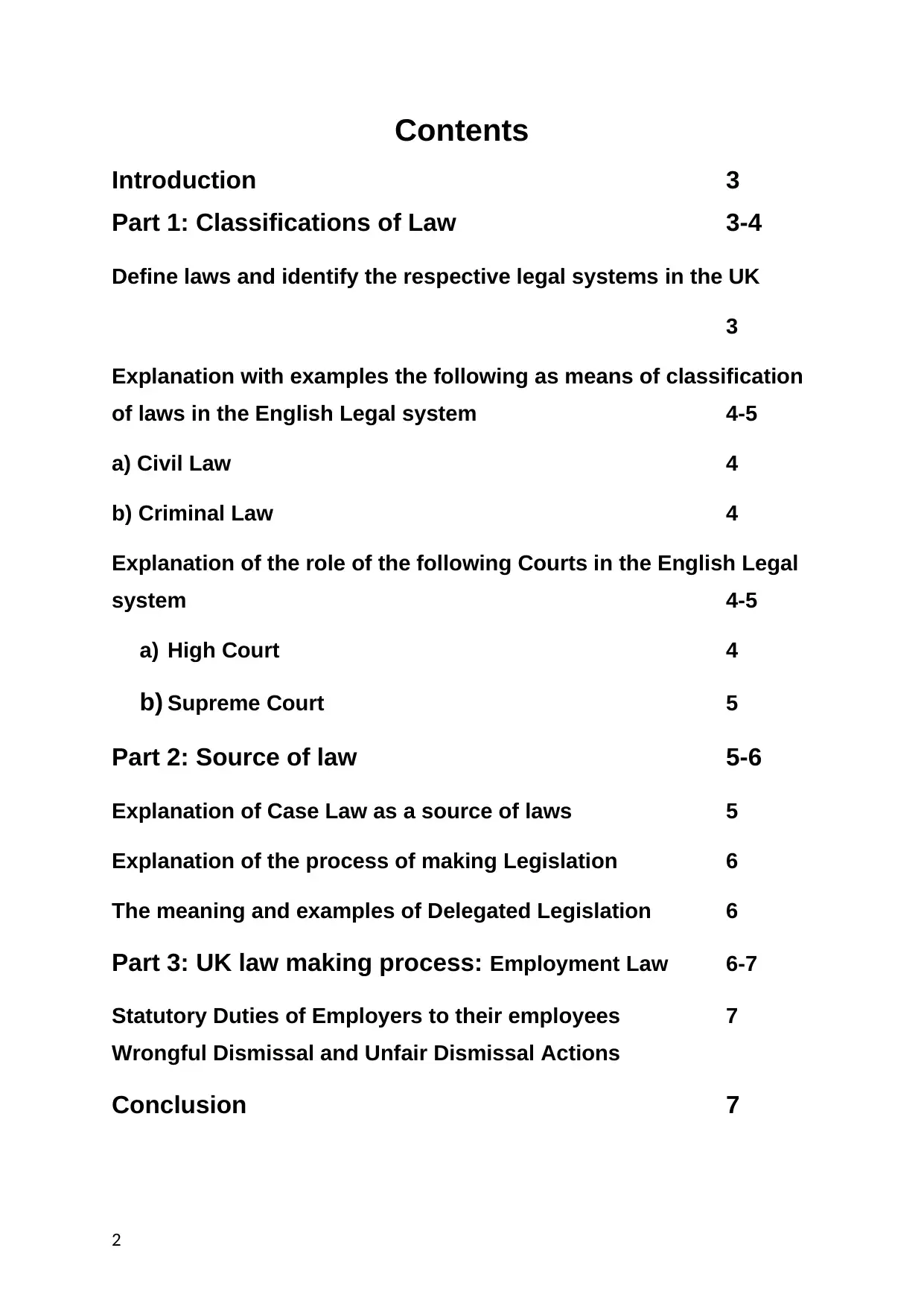
Contents
Introduction 3
Part 1: Classifications of Law 3-4
Define laws and identify the respective legal systems in the UK
3
Explanation with examples the following as means of classification
of laws in the English Legal system 4-5
a) Civil Law 4
b) Criminal Law 4
Explanation of the role of the following Courts in the English Legal
system 4-5
a) High Court 4
b) Supreme Court 5
Part 2: Source of law 5-6
Explanation of Case Law as a source of laws 5
Explanation of the process of making Legislation 6
The meaning and examples of Delegated Legislation 6
Part 3: UK law making process: Employment Law 6-7
Statutory Duties of Employers to their employees 7
Wrongful Dismissal and Unfair Dismissal Actions
Conclusion 7
2
Introduction 3
Part 1: Classifications of Law 3-4
Define laws and identify the respective legal systems in the UK
3
Explanation with examples the following as means of classification
of laws in the English Legal system 4-5
a) Civil Law 4
b) Criminal Law 4
Explanation of the role of the following Courts in the English Legal
system 4-5
a) High Court 4
b) Supreme Court 5
Part 2: Source of law 5-6
Explanation of Case Law as a source of laws 5
Explanation of the process of making Legislation 6
The meaning and examples of Delegated Legislation 6
Part 3: UK law making process: Employment Law 6-7
Statutory Duties of Employers to their employees 7
Wrongful Dismissal and Unfair Dismissal Actions
Conclusion 7
2

3
⊘ This is a preview!⊘
Do you want full access?
Subscribe today to unlock all pages.

Trusted by 1+ million students worldwide
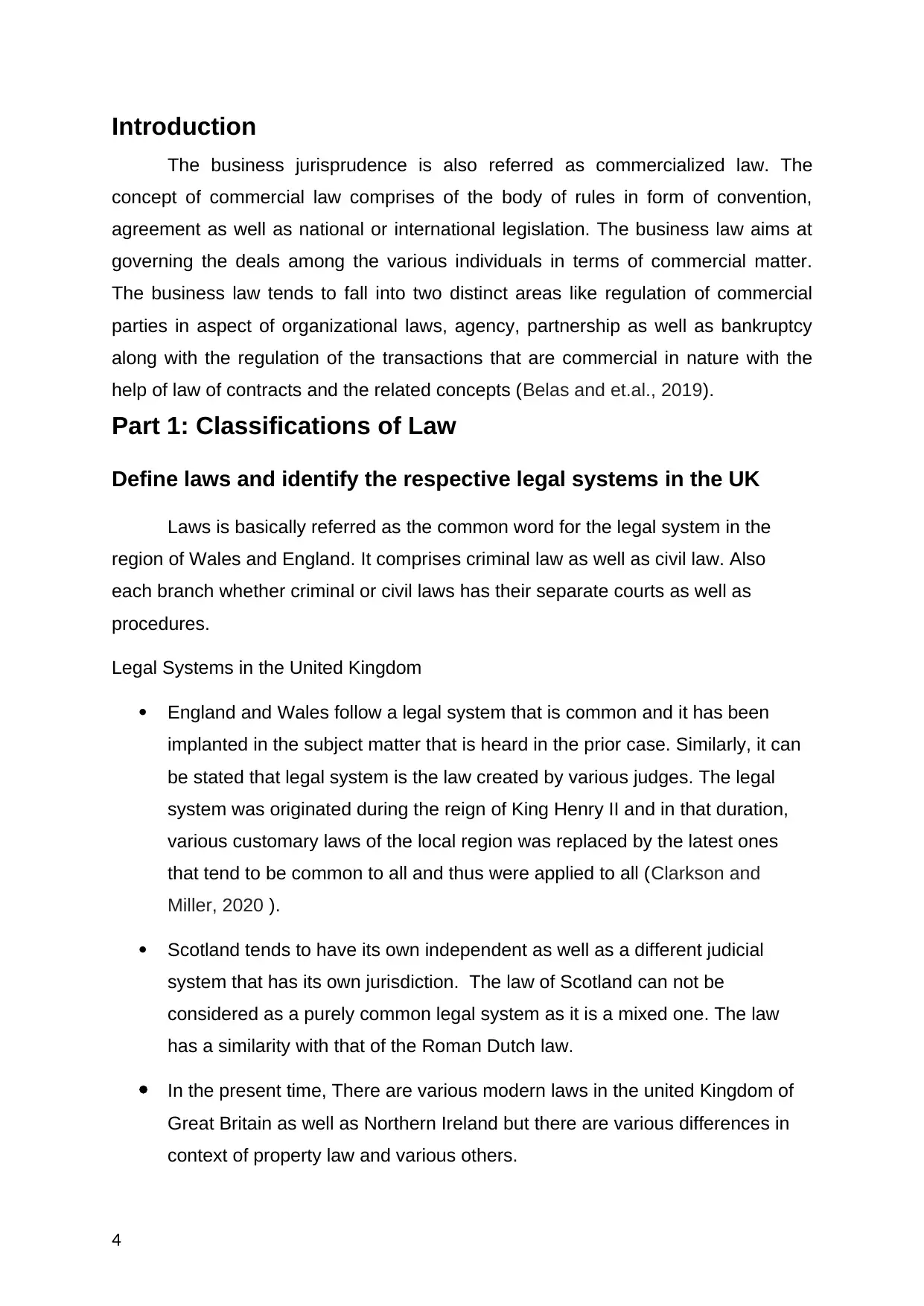
Introduction
The business jurisprudence is also referred as commercialized law. The
concept of commercial law comprises of the body of rules in form of convention,
agreement as well as national or international legislation. The business law aims at
governing the deals among the various individuals in terms of commercial matter.
The business law tends to fall into two distinct areas like regulation of commercial
parties in aspect of organizational laws, agency, partnership as well as bankruptcy
along with the regulation of the transactions that are commercial in nature with the
help of law of contracts and the related concepts (Belas and et.al., 2019).
Part 1: Classifications of Law
Define laws and identify the respective legal systems in the UK
Laws is basically referred as the common word for the legal system in the
region of Wales and England. It comprises criminal law as well as civil law. Also
each branch whether criminal or civil laws has their separate courts as well as
procedures.
Legal Systems in the United Kingdom
England and Wales follow a legal system that is common and it has been
implanted in the subject matter that is heard in the prior case. Similarly, it can
be stated that legal system is the law created by various judges. The legal
system was originated during the reign of King Henry II and in that duration,
various customary laws of the local region was replaced by the latest ones
that tend to be common to all and thus were applied to all (Clarkson and
Miller, 2020 ).
Scotland tends to have its own independent as well as a different judicial
system that has its own jurisdiction. The law of Scotland can not be
considered as a purely common legal system as it is a mixed one. The law
has a similarity with that of the Roman Dutch law.
In the present time, There are various modern laws in the united Kingdom of
Great Britain as well as Northern Ireland but there are various differences in
context of property law and various others.
4
The business jurisprudence is also referred as commercialized law. The
concept of commercial law comprises of the body of rules in form of convention,
agreement as well as national or international legislation. The business law aims at
governing the deals among the various individuals in terms of commercial matter.
The business law tends to fall into two distinct areas like regulation of commercial
parties in aspect of organizational laws, agency, partnership as well as bankruptcy
along with the regulation of the transactions that are commercial in nature with the
help of law of contracts and the related concepts (Belas and et.al., 2019).
Part 1: Classifications of Law
Define laws and identify the respective legal systems in the UK
Laws is basically referred as the common word for the legal system in the
region of Wales and England. It comprises criminal law as well as civil law. Also
each branch whether criminal or civil laws has their separate courts as well as
procedures.
Legal Systems in the United Kingdom
England and Wales follow a legal system that is common and it has been
implanted in the subject matter that is heard in the prior case. Similarly, it can
be stated that legal system is the law created by various judges. The legal
system was originated during the reign of King Henry II and in that duration,
various customary laws of the local region was replaced by the latest ones
that tend to be common to all and thus were applied to all (Clarkson and
Miller, 2020 ).
Scotland tends to have its own independent as well as a different judicial
system that has its own jurisdiction. The law of Scotland can not be
considered as a purely common legal system as it is a mixed one. The law
has a similarity with that of the Roman Dutch law.
In the present time, There are various modern laws in the united Kingdom of
Great Britain as well as Northern Ireland but there are various differences in
context of property law and various others.
4
Paraphrase This Document
Need a fresh take? Get an instant paraphrase of this document with our AI Paraphraser
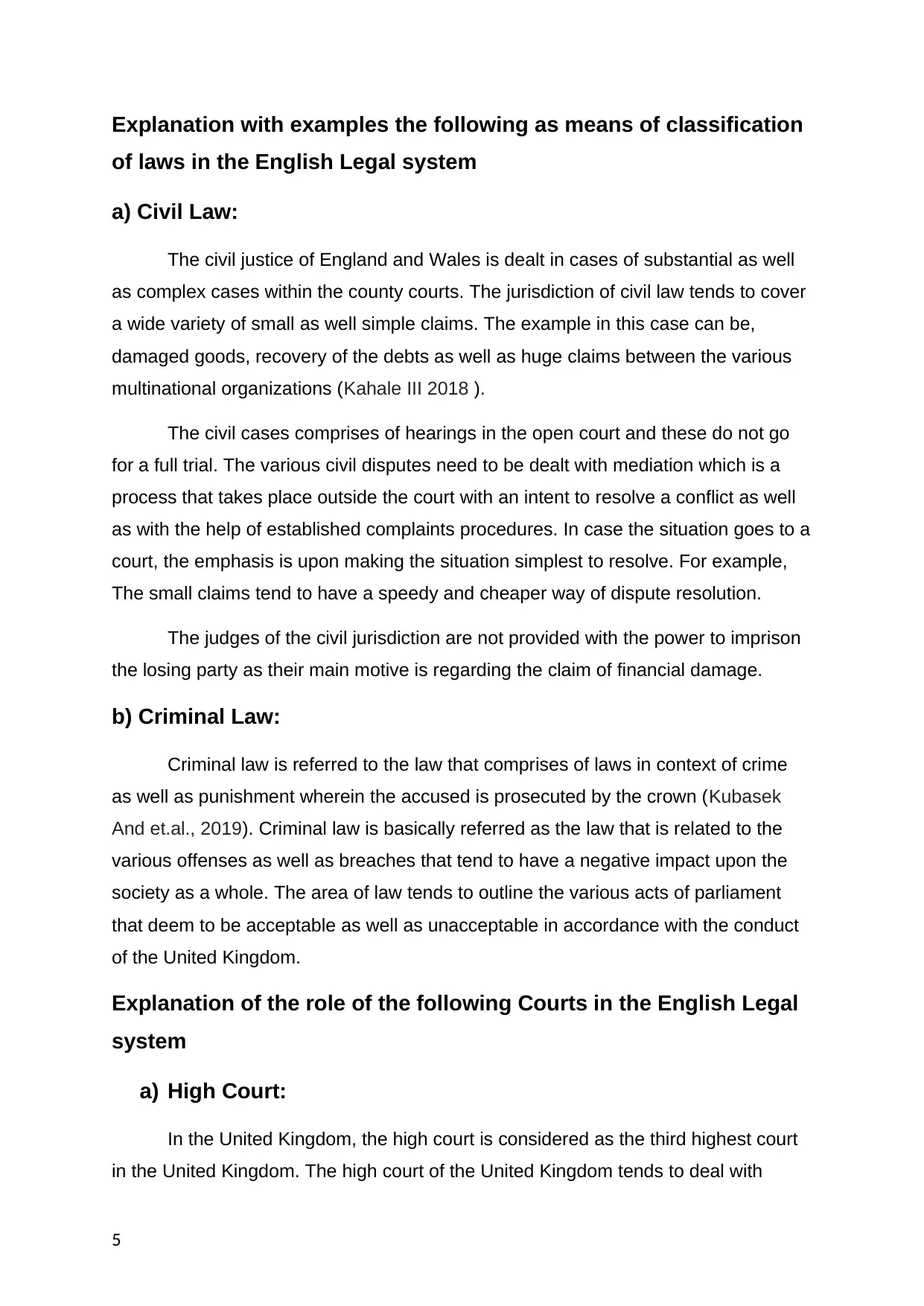
Explanation with examples the following as means of classification
of laws in the English Legal system
a) Civil Law:
The civil justice of England and Wales is dealt in cases of substantial as well
as complex cases within the county courts. The jurisdiction of civil law tends to cover
a wide variety of small as well simple claims. The example in this case can be,
damaged goods, recovery of the debts as well as huge claims between the various
multinational organizations (Kahale III 2018 ).
The civil cases comprises of hearings in the open court and these do not go
for a full trial. The various civil disputes need to be dealt with mediation which is a
process that takes place outside the court with an intent to resolve a conflict as well
as with the help of established complaints procedures. In case the situation goes to a
court, the emphasis is upon making the situation simplest to resolve. For example,
The small claims tend to have a speedy and cheaper way of dispute resolution.
The judges of the civil jurisdiction are not provided with the power to imprison
the losing party as their main motive is regarding the claim of financial damage.
b) Criminal Law:
Criminal law is referred to the law that comprises of laws in context of crime
as well as punishment wherein the accused is prosecuted by the crown (Kubasek
And et.al., 2019). Criminal law is basically referred as the law that is related to the
various offenses as well as breaches that tend to have a negative impact upon the
society as a whole. The area of law tends to outline the various acts of parliament
that deem to be acceptable as well as unacceptable in accordance with the conduct
of the United Kingdom.
Explanation of the role of the following Courts in the English Legal
system
a) High Court:
In the United Kingdom, the high court is considered as the third highest court
in the United Kingdom. The high court of the United Kingdom tends to deal with
5
of laws in the English Legal system
a) Civil Law:
The civil justice of England and Wales is dealt in cases of substantial as well
as complex cases within the county courts. The jurisdiction of civil law tends to cover
a wide variety of small as well simple claims. The example in this case can be,
damaged goods, recovery of the debts as well as huge claims between the various
multinational organizations (Kahale III 2018 ).
The civil cases comprises of hearings in the open court and these do not go
for a full trial. The various civil disputes need to be dealt with mediation which is a
process that takes place outside the court with an intent to resolve a conflict as well
as with the help of established complaints procedures. In case the situation goes to a
court, the emphasis is upon making the situation simplest to resolve. For example,
The small claims tend to have a speedy and cheaper way of dispute resolution.
The judges of the civil jurisdiction are not provided with the power to imprison
the losing party as their main motive is regarding the claim of financial damage.
b) Criminal Law:
Criminal law is referred to the law that comprises of laws in context of crime
as well as punishment wherein the accused is prosecuted by the crown (Kubasek
And et.al., 2019). Criminal law is basically referred as the law that is related to the
various offenses as well as breaches that tend to have a negative impact upon the
society as a whole. The area of law tends to outline the various acts of parliament
that deem to be acceptable as well as unacceptable in accordance with the conduct
of the United Kingdom.
Explanation of the role of the following Courts in the English Legal
system
a) High Court:
In the United Kingdom, the high court is considered as the third highest court
in the United Kingdom. The high court of the United Kingdom tends to deal with
5
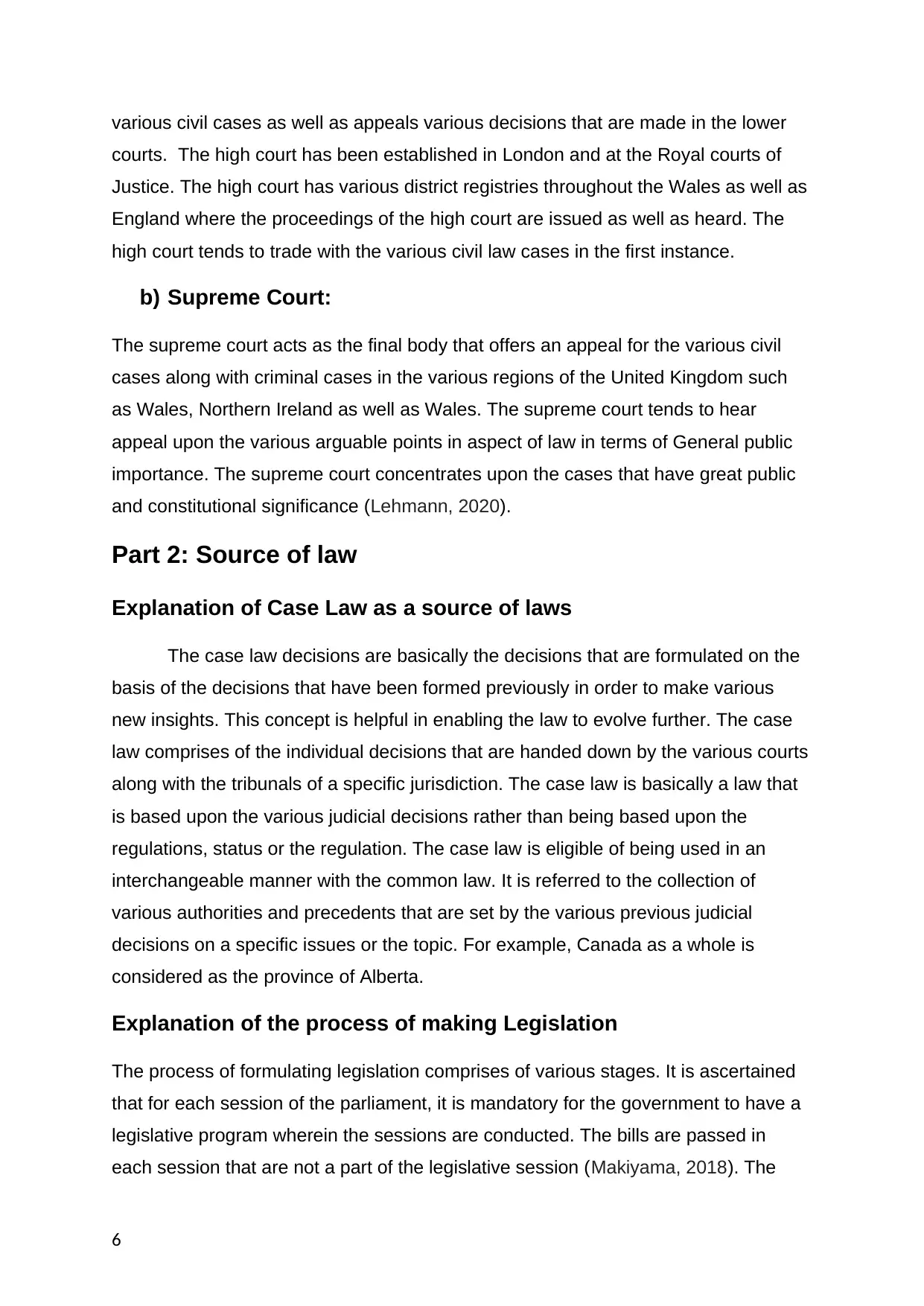
various civil cases as well as appeals various decisions that are made in the lower
courts. The high court has been established in London and at the Royal courts of
Justice. The high court has various district registries throughout the Wales as well as
England where the proceedings of the high court are issued as well as heard. The
high court tends to trade with the various civil law cases in the first instance.
b) Supreme Court:
The supreme court acts as the final body that offers an appeal for the various civil
cases along with criminal cases in the various regions of the United Kingdom such
as Wales, Northern Ireland as well as Wales. The supreme court tends to hear
appeal upon the various arguable points in aspect of law in terms of General public
importance. The supreme court concentrates upon the cases that have great public
and constitutional significance (Lehmann, 2020).
Part 2: Source of law
Explanation of Case Law as a source of laws
The case law decisions are basically the decisions that are formulated on the
basis of the decisions that have been formed previously in order to make various
new insights. This concept is helpful in enabling the law to evolve further. The case
law comprises of the individual decisions that are handed down by the various courts
along with the tribunals of a specific jurisdiction. The case law is basically a law that
is based upon the various judicial decisions rather than being based upon the
regulations, status or the regulation. The case law is eligible of being used in an
interchangeable manner with the common law. It is referred to the collection of
various authorities and precedents that are set by the various previous judicial
decisions on a specific issues or the topic. For example, Canada as a whole is
considered as the province of Alberta.
Explanation of the process of making Legislation
The process of formulating legislation comprises of various stages. It is ascertained
that for each session of the parliament, it is mandatory for the government to have a
legislative program wherein the sessions are conducted. The bills are passed in
each session that are not a part of the legislative session (Makiyama, 2018). The
6
courts. The high court has been established in London and at the Royal courts of
Justice. The high court has various district registries throughout the Wales as well as
England where the proceedings of the high court are issued as well as heard. The
high court tends to trade with the various civil law cases in the first instance.
b) Supreme Court:
The supreme court acts as the final body that offers an appeal for the various civil
cases along with criminal cases in the various regions of the United Kingdom such
as Wales, Northern Ireland as well as Wales. The supreme court tends to hear
appeal upon the various arguable points in aspect of law in terms of General public
importance. The supreme court concentrates upon the cases that have great public
and constitutional significance (Lehmann, 2020).
Part 2: Source of law
Explanation of Case Law as a source of laws
The case law decisions are basically the decisions that are formulated on the
basis of the decisions that have been formed previously in order to make various
new insights. This concept is helpful in enabling the law to evolve further. The case
law comprises of the individual decisions that are handed down by the various courts
along with the tribunals of a specific jurisdiction. The case law is basically a law that
is based upon the various judicial decisions rather than being based upon the
regulations, status or the regulation. The case law is eligible of being used in an
interchangeable manner with the common law. It is referred to the collection of
various authorities and precedents that are set by the various previous judicial
decisions on a specific issues or the topic. For example, Canada as a whole is
considered as the province of Alberta.
Explanation of the process of making Legislation
The process of formulating legislation comprises of various stages. It is ascertained
that for each session of the parliament, it is mandatory for the government to have a
legislative program wherein the sessions are conducted. The bills are passed in
each session that are not a part of the legislative session (Makiyama, 2018). The
6
⊘ This is a preview!⊘
Do you want full access?
Subscribe today to unlock all pages.

Trusted by 1+ million students worldwide
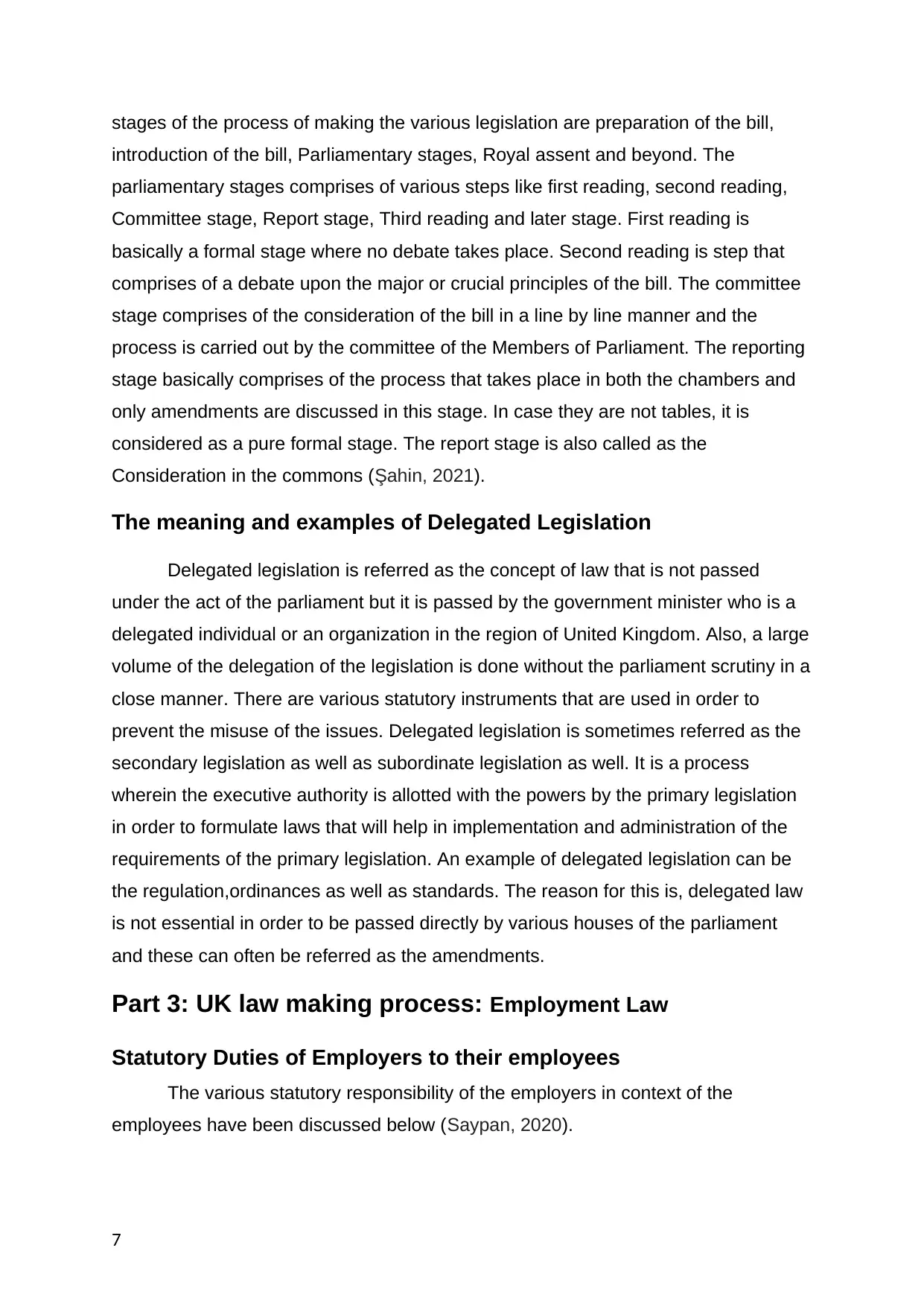
stages of the process of making the various legislation are preparation of the bill,
introduction of the bill, Parliamentary stages, Royal assent and beyond. The
parliamentary stages comprises of various steps like first reading, second reading,
Committee stage, Report stage, Third reading and later stage. First reading is
basically a formal stage where no debate takes place. Second reading is step that
comprises of a debate upon the major or crucial principles of the bill. The committee
stage comprises of the consideration of the bill in a line by line manner and the
process is carried out by the committee of the Members of Parliament. The reporting
stage basically comprises of the process that takes place in both the chambers and
only amendments are discussed in this stage. In case they are not tables, it is
considered as a pure formal stage. The report stage is also called as the
Consideration in the commons (Şahin, 2021).
The meaning and examples of Delegated Legislation
Delegated legislation is referred as the concept of law that is not passed
under the act of the parliament but it is passed by the government minister who is a
delegated individual or an organization in the region of United Kingdom. Also, a large
volume of the delegation of the legislation is done without the parliament scrutiny in a
close manner. There are various statutory instruments that are used in order to
prevent the misuse of the issues. Delegated legislation is sometimes referred as the
secondary legislation as well as subordinate legislation as well. It is a process
wherein the executive authority is allotted with the powers by the primary legislation
in order to formulate laws that will help in implementation and administration of the
requirements of the primary legislation. An example of delegated legislation can be
the regulation,ordinances as well as standards. The reason for this is, delegated law
is not essential in order to be passed directly by various houses of the parliament
and these can often be referred as the amendments.
Part 3: UK law making process: Employment Law
Statutory Duties of Employers to their employees
The various statutory responsibility of the employers in context of the
employees have been discussed below (Saypan, 2020).
7
introduction of the bill, Parliamentary stages, Royal assent and beyond. The
parliamentary stages comprises of various steps like first reading, second reading,
Committee stage, Report stage, Third reading and later stage. First reading is
basically a formal stage where no debate takes place. Second reading is step that
comprises of a debate upon the major or crucial principles of the bill. The committee
stage comprises of the consideration of the bill in a line by line manner and the
process is carried out by the committee of the Members of Parliament. The reporting
stage basically comprises of the process that takes place in both the chambers and
only amendments are discussed in this stage. In case they are not tables, it is
considered as a pure formal stage. The report stage is also called as the
Consideration in the commons (Şahin, 2021).
The meaning and examples of Delegated Legislation
Delegated legislation is referred as the concept of law that is not passed
under the act of the parliament but it is passed by the government minister who is a
delegated individual or an organization in the region of United Kingdom. Also, a large
volume of the delegation of the legislation is done without the parliament scrutiny in a
close manner. There are various statutory instruments that are used in order to
prevent the misuse of the issues. Delegated legislation is sometimes referred as the
secondary legislation as well as subordinate legislation as well. It is a process
wherein the executive authority is allotted with the powers by the primary legislation
in order to formulate laws that will help in implementation and administration of the
requirements of the primary legislation. An example of delegated legislation can be
the regulation,ordinances as well as standards. The reason for this is, delegated law
is not essential in order to be passed directly by various houses of the parliament
and these can often be referred as the amendments.
Part 3: UK law making process: Employment Law
Statutory Duties of Employers to their employees
The various statutory responsibility of the employers in context of the
employees have been discussed below (Saypan, 2020).
7
Paraphrase This Document
Need a fresh take? Get an instant paraphrase of this document with our AI Paraphraser
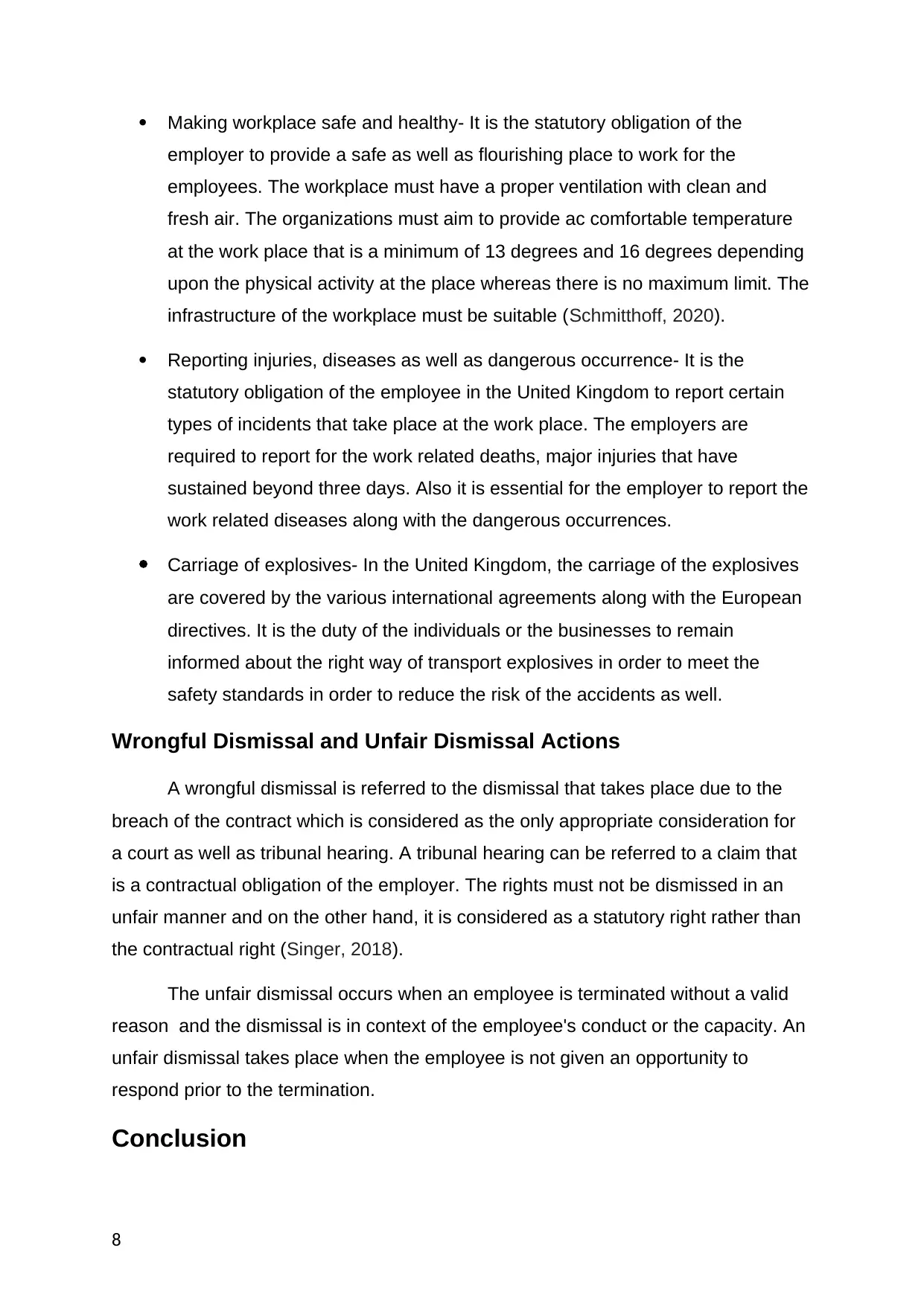
Making workplace safe and healthy- It is the statutory obligation of the
employer to provide a safe as well as flourishing place to work for the
employees. The workplace must have a proper ventilation with clean and
fresh air. The organizations must aim to provide ac comfortable temperature
at the work place that is a minimum of 13 degrees and 16 degrees depending
upon the physical activity at the place whereas there is no maximum limit. The
infrastructure of the workplace must be suitable (Schmitthoff, 2020).
Reporting injuries, diseases as well as dangerous occurrence- It is the
statutory obligation of the employee in the United Kingdom to report certain
types of incidents that take place at the work place. The employers are
required to report for the work related deaths, major injuries that have
sustained beyond three days. Also it is essential for the employer to report the
work related diseases along with the dangerous occurrences.
Carriage of explosives- In the United Kingdom, the carriage of the explosives
are covered by the various international agreements along with the European
directives. It is the duty of the individuals or the businesses to remain
informed about the right way of transport explosives in order to meet the
safety standards in order to reduce the risk of the accidents as well.
Wrongful Dismissal and Unfair Dismissal Actions
A wrongful dismissal is referred to the dismissal that takes place due to the
breach of the contract which is considered as the only appropriate consideration for
a court as well as tribunal hearing. A tribunal hearing can be referred to a claim that
is a contractual obligation of the employer. The rights must not be dismissed in an
unfair manner and on the other hand, it is considered as a statutory right rather than
the contractual right (Singer, 2018).
The unfair dismissal occurs when an employee is terminated without a valid
reason and the dismissal is in context of the employee's conduct or the capacity. An
unfair dismissal takes place when the employee is not given an opportunity to
respond prior to the termination.
Conclusion
8
employer to provide a safe as well as flourishing place to work for the
employees. The workplace must have a proper ventilation with clean and
fresh air. The organizations must aim to provide ac comfortable temperature
at the work place that is a minimum of 13 degrees and 16 degrees depending
upon the physical activity at the place whereas there is no maximum limit. The
infrastructure of the workplace must be suitable (Schmitthoff, 2020).
Reporting injuries, diseases as well as dangerous occurrence- It is the
statutory obligation of the employee in the United Kingdom to report certain
types of incidents that take place at the work place. The employers are
required to report for the work related deaths, major injuries that have
sustained beyond three days. Also it is essential for the employer to report the
work related diseases along with the dangerous occurrences.
Carriage of explosives- In the United Kingdom, the carriage of the explosives
are covered by the various international agreements along with the European
directives. It is the duty of the individuals or the businesses to remain
informed about the right way of transport explosives in order to meet the
safety standards in order to reduce the risk of the accidents as well.
Wrongful Dismissal and Unfair Dismissal Actions
A wrongful dismissal is referred to the dismissal that takes place due to the
breach of the contract which is considered as the only appropriate consideration for
a court as well as tribunal hearing. A tribunal hearing can be referred to a claim that
is a contractual obligation of the employer. The rights must not be dismissed in an
unfair manner and on the other hand, it is considered as a statutory right rather than
the contractual right (Singer, 2018).
The unfair dismissal occurs when an employee is terminated without a valid
reason and the dismissal is in context of the employee's conduct or the capacity. An
unfair dismissal takes place when the employee is not given an opportunity to
respond prior to the termination.
Conclusion
8
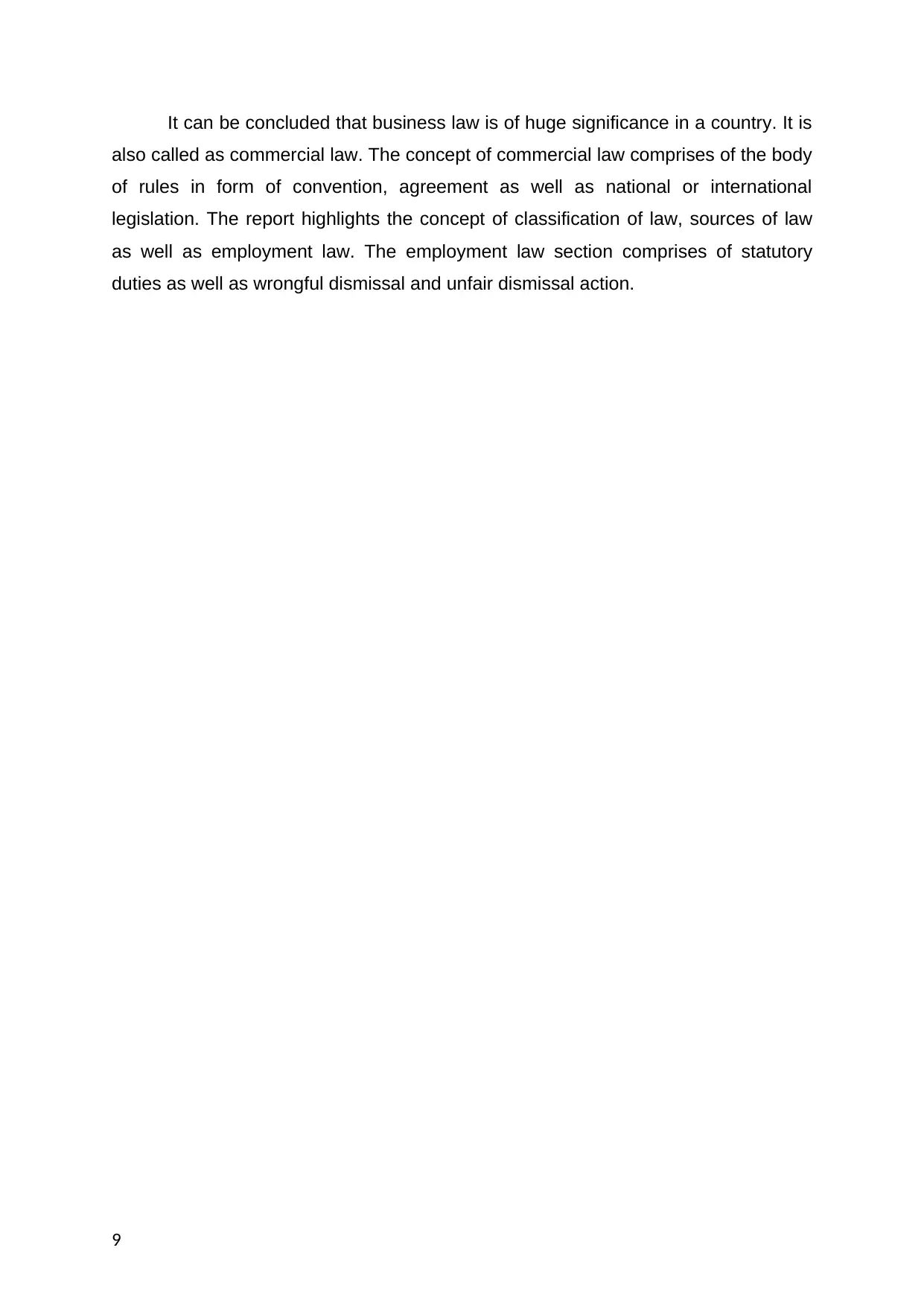
It can be concluded that business law is of huge significance in a country. It is
also called as commercial law. The concept of commercial law comprises of the body
of rules in form of convention, agreement as well as national or international
legislation. The report highlights the concept of classification of law, sources of law
as well as employment law. The employment law section comprises of statutory
duties as well as wrongful dismissal and unfair dismissal action.
9
also called as commercial law. The concept of commercial law comprises of the body
of rules in form of convention, agreement as well as national or international
legislation. The report highlights the concept of classification of law, sources of law
as well as employment law. The employment law section comprises of statutory
duties as well as wrongful dismissal and unfair dismissal action.
9
⊘ This is a preview!⊘
Do you want full access?
Subscribe today to unlock all pages.

Trusted by 1+ million students worldwide
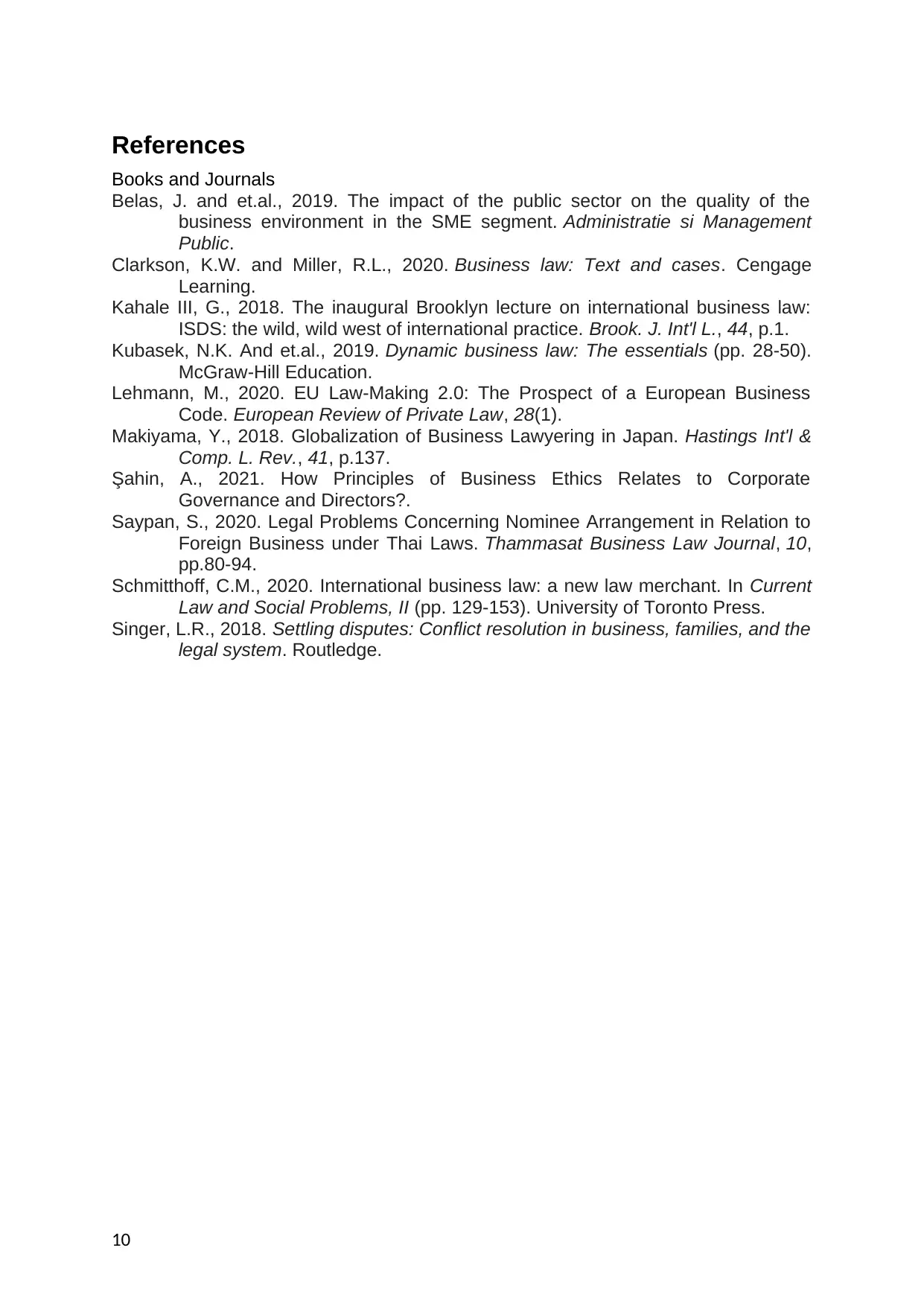
References
Books and Journals
Belas, J. and et.al., 2019. The impact of the public sector on the quality of the
business environment in the SME segment. Administratie si Management
Public.
Clarkson, K.W. and Miller, R.L., 2020. Business law: Text and cases. Cengage
Learning.
Kahale III, G., 2018. The inaugural Brooklyn lecture on international business law:
ISDS: the wild, wild west of international practice. Brook. J. Int'l L., 44, p.1.
Kubasek, N.K. And et.al., 2019. Dynamic business law: The essentials (pp. 28-50).
McGraw-Hill Education.
Lehmann, M., 2020. EU Law-Making 2.0: The Prospect of a European Business
Code. European Review of Private Law, 28(1).
Makiyama, Y., 2018. Globalization of Business Lawyering in Japan. Hastings Int'l &
Comp. L. Rev., 41, p.137.
Şahin, A., 2021. How Principles of Business Ethics Relates to Corporate
Governance and Directors?.
Saypan, S., 2020. Legal Problems Concerning Nominee Arrangement in Relation to
Foreign Business under Thai Laws. Thammasat Business Law Journal, 10,
pp.80-94.
Schmitthoff, C.M., 2020. International business law: a new law merchant. In Current
Law and Social Problems, II (pp. 129-153). University of Toronto Press.
Singer, L.R., 2018. Settling disputes: Conflict resolution in business, families, and the
legal system. Routledge.
10
Books and Journals
Belas, J. and et.al., 2019. The impact of the public sector on the quality of the
business environment in the SME segment. Administratie si Management
Public.
Clarkson, K.W. and Miller, R.L., 2020. Business law: Text and cases. Cengage
Learning.
Kahale III, G., 2018. The inaugural Brooklyn lecture on international business law:
ISDS: the wild, wild west of international practice. Brook. J. Int'l L., 44, p.1.
Kubasek, N.K. And et.al., 2019. Dynamic business law: The essentials (pp. 28-50).
McGraw-Hill Education.
Lehmann, M., 2020. EU Law-Making 2.0: The Prospect of a European Business
Code. European Review of Private Law, 28(1).
Makiyama, Y., 2018. Globalization of Business Lawyering in Japan. Hastings Int'l &
Comp. L. Rev., 41, p.137.
Şahin, A., 2021. How Principles of Business Ethics Relates to Corporate
Governance and Directors?.
Saypan, S., 2020. Legal Problems Concerning Nominee Arrangement in Relation to
Foreign Business under Thai Laws. Thammasat Business Law Journal, 10,
pp.80-94.
Schmitthoff, C.M., 2020. International business law: a new law merchant. In Current
Law and Social Problems, II (pp. 129-153). University of Toronto Press.
Singer, L.R., 2018. Settling disputes: Conflict resolution in business, families, and the
legal system. Routledge.
10
1 out of 10
Related Documents
Your All-in-One AI-Powered Toolkit for Academic Success.
+13062052269
info@desklib.com
Available 24*7 on WhatsApp / Email
![[object Object]](/_next/static/media/star-bottom.7253800d.svg)
Unlock your academic potential
Copyright © 2020–2025 A2Z Services. All Rights Reserved. Developed and managed by ZUCOL.



